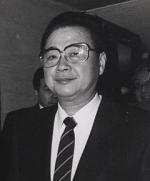Disable ads!
Li Peng
This article contains Chinese text. Without proper rendering support, you may see question marks, boxes, or other symbols instead of Chinese characters. Li Peng Simplified Chinese 李鹏 Traditional Chinese 李鵬 Transcriptions Mandarin Hanyu Pinyin Lǐ Péng Wade–Giles Li P'eng Min Hokkien POJ Lí Pîng Cantonese Jyutping lei5 paang4 Li Peng (born 20 October 1928) served as the fourth Premier of the People's Republic of China, between 1987 and 1998, and the Chairman of the Standing Committee of the National People's Congress, China's top legislative body, from 1998 to 2003. For much of the 1990s Li was ranked second in the Communist Party of China (CPC) hierarchy behind then Party General Secretary Jiang Zemin. He retained his seat on the CPC Politburo Standing Committee until 2002. As Premier, Li was the most visible representative of China's government who backed the use of force to quell the Tiananmen Square protests of 1989. During the Tiananmen protests of 1989, Li used his authority as Premier to declare martial law, and in cooperation with Deng Xiaoping, who was the Chairman of the Central Military Commission, to order the June 1989 military crackdown against student pro-democracy demonstrators in Tiananmen Square, Beijing. Li also advocated for a largely conservative approach with Chinese economic reform, which placed him at odds with General Secretary Zhao Ziyang, who fell out of favour after 1989. As Premier, Li oversaw a rapidly growing economy, and attempted to decentralize and downsize the Chinese bureaucracy, to varying degrees of success. He was at the helm of the controversial Three Gorges Dam project.
 Read more on wikipedia.org Read more on wikipedia.org
 All quotes by Li Peng All quotes by Li Peng
 Edit Edit
|

|
|
|
|
|
Background photo by Giuliana
|